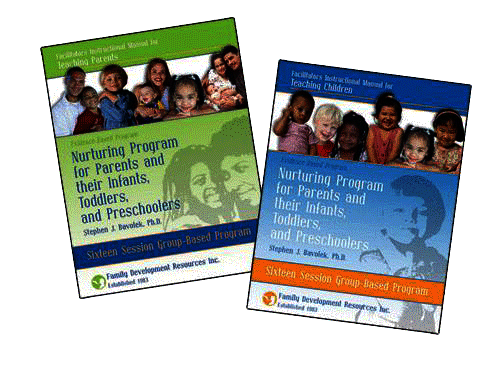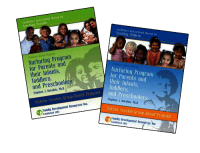

Parents and Their Infants, Toddlers, and Preschoolers - 16 Sessions was developed, implemented and validated throughout the state of Louisiana, this evidence-based program provides intense group and individual home/parent sessions to families receiving services from child welfare. Parents attend 16 group sessions each lasting 2 1/2 hours. Families can also receive individual home/parent sessions between the group sessions to ensure the knowledge and skills presented in the group sessions are being implemented in home.
Parents & Their Infants, Toddlers & Preschoolers 16 session Nurturing Program model is an evidence-based program that mirrors the Louisiana model in length, program content and implementation. Parents and their children meet concurrently in their separate groups that run 2 ½ hours for 16 consecutive weeks. Additionally, families receive seven individual home/parent sessions each 60 to 90 minutes in length.
The Individual Home/Parent Sessions occur (Children must be present for individual parent sessions):
• Prior to group session 1 to conduct the pretest assessments;
• prior to group session 2 to review the pretest assessment results;
• between group sessions 14 and 15 to complete posttest assessments and,
• between group sessions 15 and 16 to review posttest results
The remaining three individual home/parent sessions are scheduled throughout the program based on parents needs in learning the competencies presented in the program.
Children attend separate group sessions that meet concurrently with the parents. Children learn nurturing through games, fun interactive activities, coloring books, stories, puppets, and discussion. Parents receive home-based tutorial instruction in improving parent-child interactions.
VALIDATION
The 16 session group-based/seven individual home/parent sessions Nurturing Program is an evidence-based model that was developed and validated from years of extensive research throughout the state of Louisiana. The target population participating in the program were parents in child welfare referred primarily for child neglect. Parents and their children attended 16 group sessions along with intermittent individual parent sessions to ensure program competencies were being learned and practiced.
In an independent analysis of the data conducted by the Casey Family Foundation, results on 564 families participating in the program showed significant and positive improvements in all five subscales of the AAPI-2; an overall retention rate of 70%; and a repeat maltreatment rate of 12% a rate much lower than that found by many other similar studies.
The Nurturing Program for Parents and their Infants, Toddlers and Preschoolers incorporates two primary forms of data gathering: Assessment and Evaluation.
Assessment - Parent educators gather information from families in order to learn more about them, how much they already know about parenting, and the beliefs they have about raising children. This is called assessment. Assessment in the Nurturing Programs occurs at the beginning and the end of parenting programs in the form of self-report inventories. The Nurturing Program uses two pre and posttest self reports.
• The Nurturing Skills Competency Scale (NSCS) gathers information about the parents, their
partners and their family, knowledge the parents have of different parenting practices; and
how often parents use appropriate parenting practices.
• Adult-Adolescent Parenting Inventory (AAPI-2) gathers information regarding the beliefs
parents have about raising children in five individual parenting areas.
Evaluation - Parent educators want to make sure the parents are learning the knowledge and skills presented in the program. Gathering information during the program to ensure parents are learning the competencies is called process evaluation. Process evaluation occurs at the end of each session. Review questions are orally presented to parents. If the parents cannot answer the questions adequately, or if either the parent or parent educator indicates in the session evaluation that session competencies were not adequately learned, the parent and parent educator can schedule an additional office session or individual parent session to ensure lesson competencies are being learned.
There are two process evaluation measures used in the Nurturing Program:
• The Family Nurturing Journal (FNJ) is a document the PARENTS USE to monitor their progress
in learning the program competencies. Parents know the lesson competencies they are
responsible for learning as well as the home practice assignment they are to complete between
classes. To monitor their progress, parents keep a weekly journal of the changes going on in
them, their children and their family.
• The Family Nurturing Plans (FNP) are documents the PARENT EDUCATORS USE to measure
the progress the parents are making.

